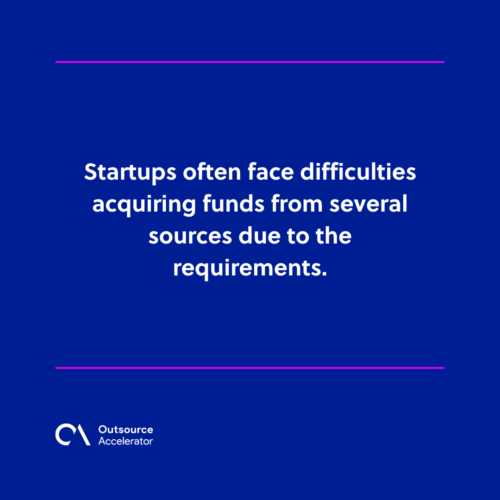Top 6 business funding options and tips for your growing business

Indeed, acquiring funding can be challenging for businesses, especially for startups. While having a concrete business plan is crucial for owners, funding is one of the vital elements that need to be considered.
The latest U.S. Bureau of Labor Statistics (BLS) report revealed that almost 20% of businesses fail in their first year of operations. Funding is one of the factors in the increasing failure rate of businesses.
Startups often face difficulties acquiring funds from several sources due to the requirements. In most cases, businesses often struggle to meet a bank’s lending qualifications.
Banks set high standards and are particular in granting loans to small businesses. They usually choose businesses with cash reserves, high sales volume, and strong credit.
If you’re considering starting your own business, take a look at the following business funding options that you can choose from.

What is business funding?
Business funding, also referred to as business financing, is the process of acquiring funds from financing sources to use for particular business needs.
Startups borrow money from banks, financial institutions, and other entities in exchange for shared ownership. They do this to acquire the initial startup capital they need to build their business.
Meanwhile, for existing organizations, business funding is typically used to pay for expenses like expansion, inventory & equipment, and seasonal spikes. Even huge companies seek financial capital to meet their short-term financial obligations.

6 types of business funding
There are different types of business funding options that business owners can utilize for their financing needed.
Let’s take a look at the six funding options below:
Seed funding
Seed funding is the first official money used to fund the earliest stage of a business. This is the amount of money that most enterprises and business ventures raise for their initial operations.
The term “seed” is an analogy for planting a tree which often leads to growth. Seed money can be used for a variety of business expenses such as fixed assets, payroll, rent, and legal consultancy costs.
Equity funding
Equity funding is a method of raising capital through the selling of shares to family, friends investors, or other financial institutions in exchange for cash.
It is one of the most sought-after business funding options. If a startup has no current revenues or financial history necessary to apply for loans, equity funding would be an ideal choice.
Debt financing
To simply put, debt financing occurs when a company borrows money from investors who are entitled to a share of the profits from the business. It can be long-term or short-term. It entails selling debt instruments such as bonds, treasury bills, or treasury notes.
Bootstrapping
Bootstrapping is when an entrepreneur starts a business with less capital and uses his/her personal savings to build a company.
It can also come from the initial sales of a business, borrowed funds from friends or family, and other outside investments. This might be a good strategy for startups since it allows full ownership of the business and retains the share of the equity.
Commercial loans
A commercial loan is composed of a debt-funding agreement between a company and a financial institution such as banks.
Business owners avail of commercial loans to meet their short-term capital needs, which are necessary to cover expenses including operational costs, infrastructure, pieces of equipment, and other expenditures.
Venture capital
Venture capital, often referred to as VC funding, is a type of financing or risk-equity funding where investors provide money to a company with long-term growth potential.
For venture capitalists, one benefit of VC funding is that it offers multiple returns on their initial investment. As for businesses, aside from funding, another advantage is that investors can also provide expertise and guidance in managing their organization.
Business angels
Business angels are high-net-worth individuals. They commonly reach out to finance startups, including small and medium enterprises (SMEs), in exchange for ownership equity of the company.
Tips for choosing the right business funding option
There are several factors you need to consider before choosing the type of funding for your business.
Here are some tips to help you determine the right business funding option for your business:
Know how each type of funding works
Take the time to understand each type of business funding. Ultimately, know which option can have long-lasting implications.
Decide which type of funding is appropriate for your business needs
Estimating your startup costs, as well as your concrete operational plan, will help you determine which type of funding is appropriate for your company. Some of the above types have drawbacks, and they might not be a good source of capital.
You should be careful in choosing the type of business funding, and it is highly recommended that you seek guidance from a financial adviser or expert.
Consider repayment terms
Some of the loans are notably complicated to acquire due to several factors like fixed interest rates or the time value of money.
In most cases, venture capitalists or business angels might have additional terms. It is essential to consider the repayment terms and how often you will be required to pay.
Secure funding requirements
Choose the type of business funding from sources where you can meet full qualifications and requirements. Some of the lending requirements may include credit ratings or interest coverage ratios.
As you can see, before choosing the type of funding for your business, you must look at its advantages and disadvantages. In some cases, some businesses often use mixed financing options depending on their specific needs.







 Independent
Independent




